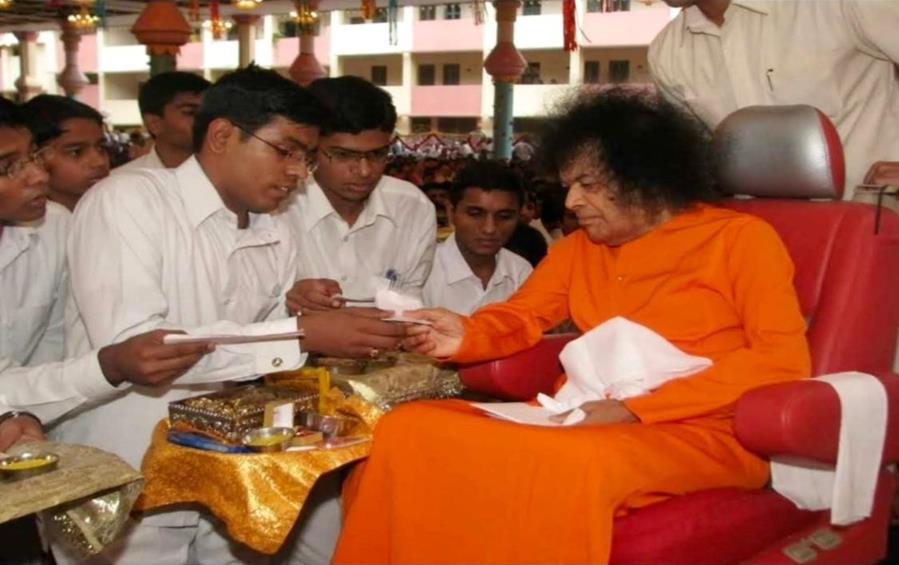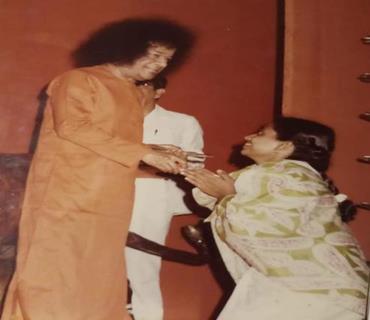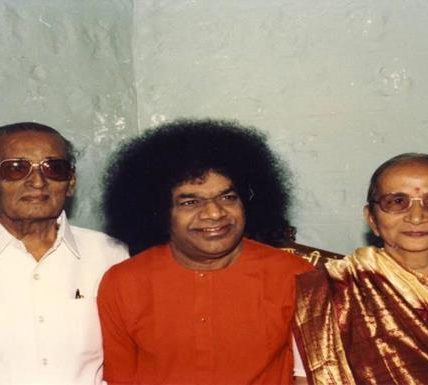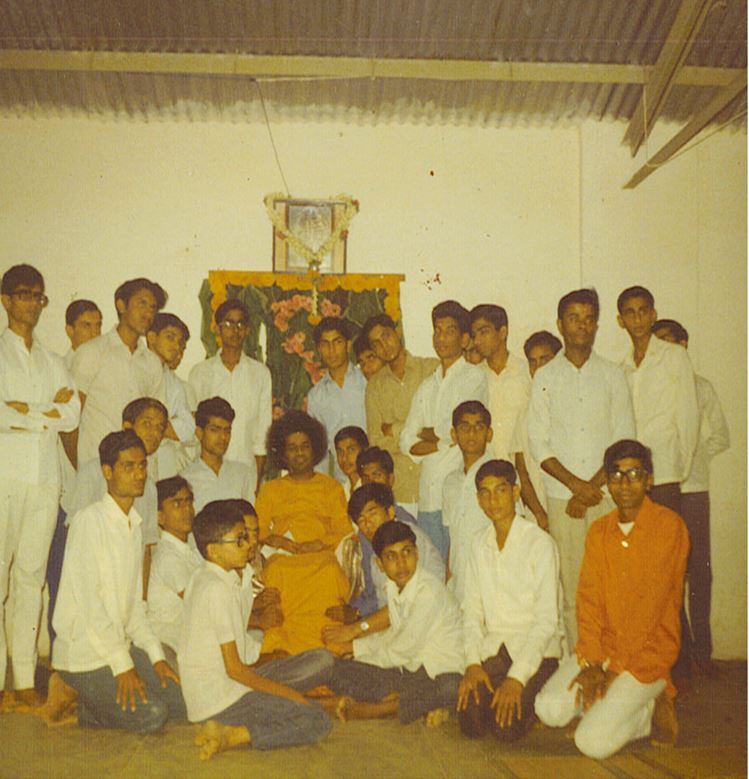The Stage Was Always His
Shivkumar Shankarnarayan, MBA (Finance, 2012–14) | B.Com (Hons., 2009–12) Currently serving as Director – Finance at Straive, Chennai, Shivkumar leads FP&A and strategic finance initiatives across global operations. During his student days, he was an active part of the Sathya Sai Brass Band and Dramatics Team—passions he proudly continues to this day, thanks to the enduring love and blessings of Bhagawan.

It was time for Vidyābhyāsam—the sacred beginning of learning, when Swami would lovingly write Om on the slate and bless a child’s educational journey.
In those days at Sai Kulwant Hall, there was an unspoken code—pin-drop silence, no calling out, and certainly no trying to catch Swami’s attention unless He looked your way. But my mother, ever hopeful, had embroidered Swami’s image in Abhayahasta along with the sacred Omkaram on a piece of yellow cloth. A quiet prayer in thread and devotion.
We had the blessing of attending five darśans. Each day, our tokens ranged between 3 and 6—not too close, but not too far either. I would sit on my father’s lap, clutching that yellow cloth like a placard, hoping Swami would see it and understand.
The divine music would play. Swami would glide down the aisle—grace in motion— accepting letters, blessing devotees, picking people for interviews. And each time, I’d stretch out my tiny hands, neck craned, eyes wide with longing. And each time, He’d look… and walk past.
After the fifth darśan, we were heartbroken. Maybe we weren’t ready. Maybe our prayers didn’t reach Him. With heavy hearts, we prepared to return to Mumbai. Before leaving, we bowed before Lord Ganesha, offering our thanks that at least we got to see our beloved Swami. Just then, my grandfather came running—his face lit with urgency and excitement. He was an After the fifth darśan, we were heartbroken. Maybe we weren’t ready. Maybe our prayers didn’t reach Him. With heavy hearts, we prepared to return to Mumbai. Before leaving, we bowed before Lord Ganesha, offering our thanks that at least we got to see our beloved Swami. Just then, my grandfather came running—his face lit with urgency and excitement. He was an active Kerala Sevadal, and this was the last day of seva for their group. “Swami has called the Sevadals for blessings before they leave for Kerala!” he said. He scooped me up in his arms— and off we went, still holding my slate, chalk, and that yellow cloth which hadn’t left my hands since we arrived in Parthi.
We were seated towards the back with the Sevadal group—those who had done shrama seva. Swami walked down the line, blessing each one, giving vibhuti. I still held the cloth high, eyes fixed on Him like a chakor waiting for the moon.
Then, unexpectedly, He paused, looked at me, and beckoned.
I rushed forward, heart pounding, tiny feet flying—worried He might change His mind if I took too long. He asked me to place the yellow cloth on the floor. I gently laid it down. Swami stepped onto it, picked up my slate, and with great care, wrote “ॐ” in Devanagari.
He handed it back to me. I dropped to the ground in full sashtanga namaskaram—flat on the floor, every bit of me surrendering at His feet. Swami was visibly amused to see a little one do that. He smiled warmly, waved His hand in that signature circle—and manifested a big ladoo. It was so large, I had to drop my slate and use both hands to hold it.
And then came the most unexpected blessing. Swami remained standing on the yellow cloth and invited each Sevadal to come forward for padanamaskar. One by one, they approached— eyes brimming with love, tears, and gratitude. For 15 full minutes, He stood there—smiling, blessing, lifting hearts.
In the corner, I sat quietly—watching, absorbing, and… well, finishing the entire ladoo. Everyone’s eyes were on Bhagawan, and by the time He turned and glided back towards Poornachandra Hall, the prasadam had disappeared.
My grandfather and the Sevadals noticed only then. They smiled, passed it off as innocence— and perhaps it was. But to me, it was grace, poured into the shape of a sweet.
To this day, that yellow cloth is preserved like treasure in our home. It’s not just fabric—it’s His footprint, His presence, His promise. Over the years, that moment became the foundation of a beautiful personal bond. During my school and college days, I would write small letters— just a few lines—in pocket-sized spiral books. Swami would always take them.
I believe it was His way of telling me: “You don’t need to say much. I understand even your silence.”
Just like that yellow cloth said it all back then.
By His grace, I completed my entire education—from school to MBA—under His loving guidance. That simple request from a little boy was answered in full. A promise kept.
But His ways were never linear.
I loved dramatics and theatre. I longed for the world of drama—the lights, the lines, the magic of stories unfolding on stage. Acting, directing, saying lines—it gave me a thrill even as a child during summer camps. But when I joined school, my academic performance was, let’s say, less than ideal. And teachers, lovingly strict, reminded me of my first dharma—to study well for Swami. So, during our Silver Jubilee celebrations, I wasn’t picked for any role. Not a line, not a walk-on. While classmates went for rehearsals, I stayed back trying to solve for X and Y, longing to be part of the journey they were undertaking.
So I chose another path: seva. I began serving drinking water at practice venues, helped at dinner—anywhere they were short-staffed. One afternoon, a teacher came in asking for volunteers for seva. Six of us raised our hands.
He led us to the auditorium. We thought we were there to serve snacks.
An hour passed. We sat watching others rehearse. Suddenly the teacher returned, this time with one of the play’s directors. “So you are the dancers?” he asked.
Confused, we clarified—no, we were here to serve.
He chuckled. “That’s exactly why you’ve been chosen. We only want those who first wish to serve.”
And just like that, from being on the sidelines, we were suddenly inside the sanctum. We played the young Pandhari Bhajan group with young Sathya. Two dance sequences. It wasn’t the lead role—but I was inside. I belonged.
On the day of the final offering, during the group photo, I sat beside Swami. He extended His hand. I held it and wept. He smiled. And in that smile, I knew He had seen my journey. That it was He who had picked me up quietly and placed me in His drama of love.
The first photo with Bhagawan—just a tiny me, holding His hand, tears running down my cheeks. Class 8: The drama was Bhakta Bheeshma. I auditioned for Karna. Rejected.
I cried that night. I believed in miracles… but they seemed delayed.
Two months prior to the drama, a different opportunity arose. One of the teachers proposed a musical offering—songs written by Bhagawan during His Patha Mandiram days. An elderly devotee who had learnt them directly from Swami came to teach us. I was chosen as part of a 25- member music group—perhaps a consolation prize from the cosmos.
The previous year, the singing group hadn’t gotten any personal interaction with Swami. I remembered that. But I reminded myself: an opportunity is still an opportunity.
We practised from morning to dusk. At Prasanthi Nilayam, we sat through seven darśans, letters in hand, holding a card requesting permission to offer our songs. Nothing. On the seventh day, dejected, we prepared to leave.
After lunch, our teacher gathered us.
“What now?” he asked.
One student replied, “Sir, we came to sing for Bhagawan. He is here. Let us offer our songs… here.” Outside our shed, we placed a chair for Bhagawan, lit incense, and performed the entire offering— songs, interludes, speeches. Devotees gathered. We sang, cried, and ended with Aarthi.
Swami came for darshan, again took our letters and cards. And we thought—this is our final farewell.
In our hearts, it had reached Him.
Later, we packed our instruments and went for darshan. Buses had arrived to take us back.
As we entered, we met the Senior Boys Hostel warden. He asked about our visit and we told him about the musical offering.
Swami came for darshan, again took our letters and cards. And we thought—this is our final farewell.
But then, in the portico, Swami turned to the senior warden and asked, “Where are the music boys?”
Now here’s the comic twist. That evening, a group from the Mirpuri College was scheduled to offer Meera bhajans. Only three performers and two accompanists were planned—and their seating was already arranged.
But the senior warden, fresh from his conversation with us, assumed Swami meant our group. He rushed to us, breathless, “Swami is calling the music boys! Come, quick!”
And just like that, 25 of us—with harmoniums, dholaks, keyboards—charged toward Swami like a herd of elephants. The entire portico shook with our clumsy energy.
Swami laughed. A sparkle lit up His eyes.
He gestured lovingly to the bhajan group to shift and make space.Seating was limited, and only a few boys were expected to sit close to Bhagawan. As per plan, I was to sit in the last line. But miraculously, all 25 of us were accommodated—and I found myself sitting right at His lotus feet, on the steps. He had not just remembered us—He made room for us in every way possible.
We sang 10 songs. Each time we thought we’d be stopped, Swami smiled and said, “Next.”
Afterwards, He asked our names, enquired about our play (Bhakta Bheeshma), and posed for a group photo.
Tears again. This time, not of longing—but fulfillment. The next day, the drama team performed
Years passed. Final year MBA. Our Sports Meet drama was titled Jaya—about Krishna teaching the Pandavas the meaning of true victory. As we divided characters, I was given the role of Karna—yes, the same one I didn’t get in Class 8.
He wasn’t physically present anymore. But He was. Quietly fulfilling forgotten prayers. It was as though He was saying: “I never say no. I just say—not now.” And in between these milestones, He had me do so many other roles—in front of Him, behind the curtain, and most lovingly, in His Brass Band. Marching in unison, playing notes in discipline and devotion—it was a different kind of sadhana. There was no dialogue, just rhythm. And yet, even in that silence, I felt His approval.
I now realise—Vidyarambham wasn’t just about learning the alphabet. It was Swami taking me into His workshop and shaping me—role by role, song by song, beat by beat.
A spark was lit with that yellow cloth and a child’s slate. And across two decades, He fanned it gently into a flame.
For all this and more… how can I ever say thank you? I can only write. And remember.
And maybe, just maybe, someone reading this will feel what I did:
That He is never far.
That no role is too small.
That the stage was always His.
And we, the most blessed cast.




